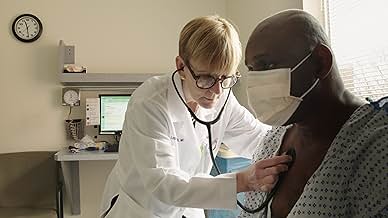Diagnosis
- Mini-série télévisée
- 2019
NOTE IMDb
7,7/10
1,4 k
MA NOTE
Ajouter une intrigue dans votre langueMedical docuseries focusing on patients with unique illnesses and their journeys to find a diagnosis and cure.Medical docuseries focusing on patients with unique illnesses and their journeys to find a diagnosis and cure.Medical docuseries focusing on patients with unique illnesses and their journeys to find a diagnosis and cure.
Parcourir les épisodes
Avis à la une
I just finished binge watching this over two days. Fascinating stuff. It presents both the best and the worst of medicine, and how serendipity and chance can mean the difference between life and death.
Amazing series not only delving into the world of medicine and the raw emotions and struggles of the people inflicted with rare and unusual conditions. All the episodes were incredible but episodes 2 and 4 (dealing with young children), had me in tears. A must see on Netflix.
I lack any critiques for this series, except perhaps that there are only seven episodes! I'm invested in these cases, and want to know how they end up; the stories are told in a beautifully real way although it allows you to view the intricacies and struggles in each situacion. Inspiring doctor as well, renewed my passion for my studies (healthcare, although a different field) with each episode that I viewed; truly a beautiful role model and such an excellent concept. Very well done.
Modern medicine and diagnostics nightmare "by the top specialists in the world".
1. The guy faints when he is SITTING and in the middle of discussing where to get coffee. He is NOT standing, his blood isn't pooled into his extremities, therefore not causing his BP to drop, he is not stressed. WE DISREGARD ALL that and still think it could be Vasovagal syncope.
Okay! Lets do Tilt Table Test.
2. "..typical scenario.... your blood pressure starts to drop...and his fainting caused by reduced blood flow to the brain...." , so TTT should show us what happens to his HR and BP when he is STANDING, BUT NOT TO THE FLOW OF BLOOD TO HIS BRAIN; remember, he faints in a sitting position.
In true Postural Orthostatic Tachycardia Syndrome (POTS), NOT VASOVAGAL SYNCOPE, a person faints while STANDING, BUT his BP remains NORMAL. Yes, HR goes up, blood pools into legs, BUT BP remains normal..and the person faints. In Vasovagal syncope, his BP DROPS. Who knows what is going on systemwide when a person experiencing Cerebral syncope.
3. In his case, he is investigated for Vasovagal syncope, not POTS. His doctor doesn't even mention POTS. Then he tells us that fainting is typically caused by reduced blood flow to the brain. Typically? Based on what ?? On assumption I guess. I don't see any transcranial dopplers (TCD) during TTT procedure. TCD is a non-invasive, painless ultrasound technique that uses high-frequency sound waves to measure the rate and direction of blood flow inside vessels. They don't use TCD during his TTT, yet make conclusions about blood flow!?!
4. So we have no idea if blood vessels in his brain constrict or dilate when he passes out.
The existing theories of cerebral blood flow autoregulation would have predicted a sudden cerebral arteriolar vasodilation at the time of syncope, in order to help preserve cerebral perfusion. Instead, what was uniformly reported was a sudden significant increase in cerebral vascular resistance (signifying arteriolar vasoconstriction) as measured by TCD, which occurred concomitant with the loss of consciousness. They even call it "A Paradoxic and Unexpected Response".
But it is not investigated in his (or most) case. So we don't know.
5. Did they consider association between Syncope and Myocardial Bridge? Myocardial bridging: A 'forgotten' cause of acute coronary syndrome. Was he investigated for that?
Yes, we all know stress exacerbate symptoms. But heart just don't stop beating out of the blue when a person is not stressed- playing board games or SITTING in a car and talking..
Lastly, why ALL cardiovascular test are performed when a person is in a supine position? People rarely, if ever, have a syncope or presyncope while being horizontal. To really know what is going on one has to replicate real life conditions, don't you think?
1. The guy faints when he is SITTING and in the middle of discussing where to get coffee. He is NOT standing, his blood isn't pooled into his extremities, therefore not causing his BP to drop, he is not stressed. WE DISREGARD ALL that and still think it could be Vasovagal syncope.
Okay! Lets do Tilt Table Test.
2. "..typical scenario.... your blood pressure starts to drop...and his fainting caused by reduced blood flow to the brain...." , so TTT should show us what happens to his HR and BP when he is STANDING, BUT NOT TO THE FLOW OF BLOOD TO HIS BRAIN; remember, he faints in a sitting position.
In true Postural Orthostatic Tachycardia Syndrome (POTS), NOT VASOVAGAL SYNCOPE, a person faints while STANDING, BUT his BP remains NORMAL. Yes, HR goes up, blood pools into legs, BUT BP remains normal..and the person faints. In Vasovagal syncope, his BP DROPS. Who knows what is going on systemwide when a person experiencing Cerebral syncope.
3. In his case, he is investigated for Vasovagal syncope, not POTS. His doctor doesn't even mention POTS. Then he tells us that fainting is typically caused by reduced blood flow to the brain. Typically? Based on what ?? On assumption I guess. I don't see any transcranial dopplers (TCD) during TTT procedure. TCD is a non-invasive, painless ultrasound technique that uses high-frequency sound waves to measure the rate and direction of blood flow inside vessels. They don't use TCD during his TTT, yet make conclusions about blood flow!?!
4. So we have no idea if blood vessels in his brain constrict or dilate when he passes out.
The existing theories of cerebral blood flow autoregulation would have predicted a sudden cerebral arteriolar vasodilation at the time of syncope, in order to help preserve cerebral perfusion. Instead, what was uniformly reported was a sudden significant increase in cerebral vascular resistance (signifying arteriolar vasoconstriction) as measured by TCD, which occurred concomitant with the loss of consciousness. They even call it "A Paradoxic and Unexpected Response".
But it is not investigated in his (or most) case. So we don't know.
5. Did they consider association between Syncope and Myocardial Bridge? Myocardial bridging: A 'forgotten' cause of acute coronary syndrome. Was he investigated for that?
Yes, we all know stress exacerbate symptoms. But heart just don't stop beating out of the blue when a person is not stressed- playing board games or SITTING in a car and talking..
Lastly, why ALL cardiovascular test are performed when a person is in a supine position? People rarely, if ever, have a syncope or presyncope while being horizontal. To really know what is going on one has to replicate real life conditions, don't you think?
I just finished watching this, and quite a compelling series, a real life "House" where instead of a brilliant but quirky Doctor solving Medical Mysteries, you have Lisa Sanders and the Crowd doing it.
The episodes involving kids and the war veteran I thought were the most touching to watch. Some like the hardheaded ones not so much, but overall just awesome to watch, it gives hope, joy and sometimes lessons as well.
I hope there will be several more seasons of this from hereon.
The episodes involving kids and the war veteran I thought were the most touching to watch. Some like the hardheaded ones not so much, but overall just awesome to watch, it gives hope, joy and sometimes lessons as well.
I hope there will be several more seasons of this from hereon.
Meilleurs choix
Connectez-vous pour évaluer et suivre la liste de favoris afin de recevoir des recommandations personnalisées
- How many seasons does Diagnosis have?Alimenté par Alexa
Détails
- Couleur
Contribuer à cette page
Suggérer une modification ou ajouter du contenu manquant




















